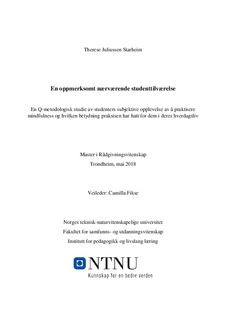En oppmerksomt nærværende studenttilværelse - En Q-metodologisk studie av studenters subjektive opplevelse av å praktisere mindfulness og hvilken betydning praksisen har hatt for dem i deres hverdagsliv
Master thesis
Permanent lenke
http://hdl.handle.net/11250/2573756Utgivelsesdato
2018Metadata
Vis full innførselSamlinger
Sammendrag
Hensikten med denne masteroppgaven har vært å undersøke studenters erfaring med og utbytte av å praktisere mindfulness. Problemstillingen studien har tatt for seg er «Hvordan opplever studenter som deltar på SiT Råds mindfulness-kurs at praktisering av mindfulness har hatt betydning for dem i deres hverdagsliv?
Forskningsmetoden valgt for denne studien er Q-metodologi. Jeg tok kontakt med SiT Råd og fikk 18 studenter som deltok på deres mindfulness-kurs til å sortere 48 ulike meningsutsagn om ulike erfaringer eller opplevelser med å praktisere mindfulness. Disse utsagnene ble utarbeidet basert på en forskningsdesign som inkluderte relevant teori og empiri. Ved hjelp av dataprogrammet PQMethod ble forskningsmaterialet analysert. Det ble valgt tre ulike faktorsyn som representerer tre ulike subjektive opplevelser av å praktisere mindfulness. Studentene tilhørende faktorsyn 1 opplever å ha blitt mer bevisst og aksepterende både i møte med seg selv, andre og ytre omstendigheter. Studentene tilhørende faktorsyn 2 opplever fortsatt mye tankevandring, men har samtidig innsett at en ikke ER tankene sine og har dermed oppnådd et mer løsrevet forhold til sitt tankeinnhold. Studentene tilhørende faktorsyn 3 har ikke fått noe konkret utbytte av mindfulness, og de opplever ting stort sett på samme måte som før. Felles for faktorsynene er at meditasjon oppleves som en behagelig pause. Alle har også en positiv innstilling til mindfulness, en tro på at metoden kan være hjelpsomt for å håndtere stress og utfordringer samt en lyst til å praktisere videre. I tillegg opplever alle faktorsynene noe økt selv-aksept, samt noe økt toleranse i møte med negative følelser. Hovedtendenser fra de tre faktorsynene drøftes opp mot relevant teori.
Studien peker på noen bidrag og implikasjoner. Siden undersøkelsen har avdekket flere lovende funn, vil en anbefaling være å utvide SiT råds mindfulness-kurstilbud, samt opprettelse av kurs andre studiesteder der det ennå ikke eksisterer. Det oppmuntres videre til at rådgivere kan opplæres og ta i bruk elementer av mindfulness i sin yrkesutøvelse. Ut i fra funnene i denne studien vil det være særlig aktuelt i de tilfellene studenter eller andre rådsøkere har et hjelpebehov knyttet til områdene stressreduksjon, pust, bevisstgjøring, selvinnsikt, selv-aksept og aksept av utfordrende livshendelser og omstendigheter. The purpose of this study has been to examine students experience with and gain from practicing mindfulness. The research question was «How do students who participate in SiT Råds mindfulness-program experience that mindfulness-practice has influenced them in their everyday life?».
The research method chosen in this study is Q-methodology. I contacted SiT Råd and had 18 students who participated in their mindfulness-program to range 48 statements concerning different experiences with practicing mindfulness. These statements were based on a research design which included relevant theory and empiricism. Using the computer program PQmethod, the research material was analyzed. Three factors were chosen, representing three different subjective experiences with practicing mindfulness. Students within factor 1 expresses an experience of being more consciously aware and accepting, both in relation to one self, others and outer circumstances. Students within factor 2 is still experiencing a lot of wandering thoughts. At the same time, they no longer identify with the content of the mind as strongly as before and have thus achieved a more detached relationship with their thoughts. Students within factor 3 has not gained any specific outcome from the practice and they experience most things the same way as before. Commonalities across the three factors is that meditation is experienced as a pleasant break. All of them also possess a positive attitude towards mindfulness, confidence that the method can be helpful in dealing with stress and challenges, and a willingness to continue practicing. In addition to this, all the factors experience some increased self-acceptance and tolerance in meeting with negative emotions. Relevant theory is presented and used to discuss main tendencies from the three factors.
The study points to some contributions and implications. Because of some of the promising results in this study, one recommendation would be to expand the mindfulness-program arranged by Sit Råd, and in addition offer similar programs at other student campuses where it is not currently available. It is further encouraged that counselors are trained in and implement elements of mindfulness in their professional practice. Based on the results from the study at hand, this will be especially relevant in those cases where students or other clients have a need for help related to stress reduction, breathing, awareness raising, self-knowledge, self-acceptance and acceptance of challenging life events and circumstances.
